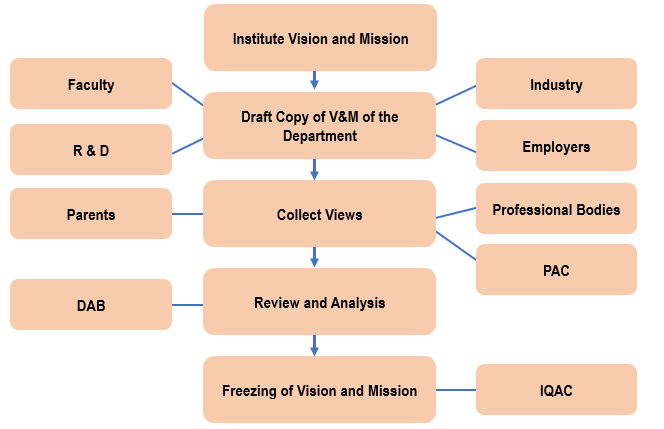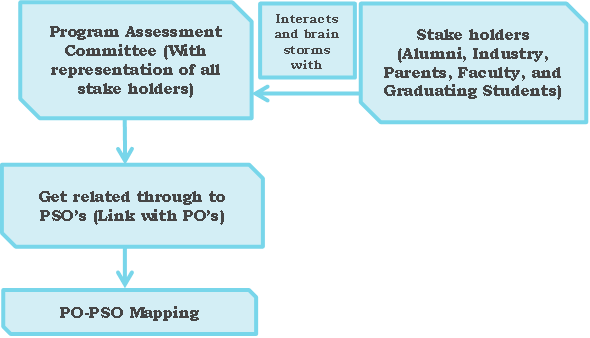
Outcome-based Education (OBE) emphasizes on many components in terms of student achievement in
a program. The most important components are the Course Outcome (CO's) Program Outcomes (POs), Program Specific Outcome (PSO's).
A knowledge-based society characterized by a scientific outlook and a culture of cooperation is the long-term goal of the Poornima Institute of Engineering & Technology, Jaipur. The institute's mission is to educate students for success in an increasingly globalized economy by providing them with a balanced education. Course Outcomes (COs) are defined for each course using Bloom's Taxonomy by each course coordinator and are approved Department Advisory Board. The Program Outcomes are in line with Washington Accord & NBA guidelines, catering to Graduate Attributed. All the CO’s and mapped with Program Outcomes (POs) and Program Specific Outcomes (PSOs) for further attainment analysis. The attainment of CO’s, PSO & PO’s in a academic year become benchmarks for Next academic session, for bridging the gap in Quality teaching pedagogy, Faculty Quality, Ambience of Institutions, Innovative practices in Teaching methodology including ICT techniques, enrichment of co-curricular & beyond curricular activities and improvement in curriculum. All of the undergraduate degree programs at the institution use this instructional strategy.

Program Outcomes (POs): » Program outcomes are statements that describe what students are expected to know and be able to do upon graduating from the program. » These are associated with the information, attitude, and conduct that students take away from the four-year curriculum, as well as their analytical abilities, knowledge, and skills. The POs basically show what the students can accomplish with the information they get from the curriculum. Therefore, POs characterize the characteristics of an engineering graduate's professional life. The following twelve points of view (POs) are relevant to all engineering curricula and were developed by the NBA for engineering graduates.
Program Specific Outcomes (PSOs): » Program Specific Outcomes means what the graduate students of a specific degree program should be able to do and Course Outcomes are the resultant knowledge skills that the students acquire at the end of the course. PSOs are built on three behavioral components: knowledge, skill, and attitude. PSOs are statements made by the institute to stakeholders (employers, students, etc.) that should be measurable, appropriate, realistic, and achievable. They describe the career and professional accomplishments that the program is preparing graduates to accomplish after 4 years of graduation.

The National Board of Accreditation (NBA) defines program outcomes as statements that specify what students are expected to know and be able to do by the time of their graduation. These are in line with the Graduate Attributes as defined by the Washington Accord. These outcomes articulate the skills, knowledge, and attitudes that students should possess upon completing their educational program. Program outcomes serve as benchmarks for assessing the effectiveness of the curriculum and ensuring that it aligns with the objectives of the program. They provide a framework for evaluating student performance and guiding continuous improvement efforts within the educational institution.
The refinement of Program Outcomes (POs) involves iterative assessment, stakeholder engagement, and curriculum alignment. Initially defined based on accreditation guidelines, POs are continuously reviewed with input from faculty, industry experts, and students. Curriculum alignment ensures that educational objectives match desired outcomes. Assessment methods are refined to measure PO attainment effectively. Feedback from stakeholders informs adjustments, fostering alignment with industry needs and educational standards. This iterative process ensures POs remain relevant and reflective of program goals, facilitating continuous improvement in educational quality.
The program Assessment committee along with the stake holders define the program specific outcomes after having a brain storming session with the stake holders.

The role of CO-PO mapping will be assigned to the faculty as per hierarchy. After the course (subject) allotment from the department, the course in-charge of the course has to write appropriate COs for their corresponding course. It should be narrower and measurable statements. By using the action verbs of learning levels, CO’s will be designed. CO statements should describe what the students are expected to know and able to do at the end of each course, which are related to the skills, knowledge and behavior that students will acquire through the course.
